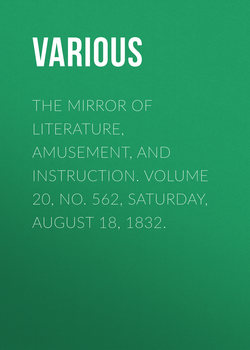Читать книгу The Mirror of Literature, Amusement, and Instruction. Volume 20, No. 562, Saturday, August 18, 1832. - Various - Страница 4
EQUANIMITY OF TEMPER
ОглавлениеGoodness of temper may be defined, to use the happy imagery of Gray, "as the sunshine of the heart." It is a more valuable bosom-attendant under the pressure of poverty and adversity, and when we are approaching the confines of infirmity and old age, than when we are revelling in the full tide of plenty, amid the exuberant strength and freshness of youth. Lord Bacon, who has analyzed some of the human accompaniments so well, is silent as to the softening sway and pleasing influence of this choice attuner of the human mind. But Shaftesbury, the illustrious author of the Characteristics, was so enamoured of it, that he terms "gravity (its counterpart,) the essence of imposture;" and so it is, for to what purpose does a man store his brain with knowledge, and the profitable burden of the sciences, if he gathers only superciliousness and pride from the hedge of learning? instead of the milder traits of general affection, and the open qualities of social feelings. I remember, when a youth, I was extremely fond of attending the House of Commons, to hear the debates; and I shall never forget the repulsive loftiness which I thought marked the physiognomy of Pitt; harsh and unbending, like a settled frost, he seemed wrapped in the mantle of egotism and sublunary conceit; and it was from the uninviting expression of this great man's countenance, that I first drew my conceptions as to how a proud and unsociable man looked. With very different emotions I was wont to survey the mild but expressive features of his great opponent, Fox: there was a placidity mixed up with the graver lines of thought and reflection, that would have invited a child to take him by the hand; indeed, the witchcraft of Mr. Fox's temper was such, that it formed a triumphant source of gratulation in the circle of his friends, from the panegyric of the late Earl of Carlisle, during his boyish days at Eton, to the prouder posthumous circles of fame with which the elegant author of The Pleasures of Memory, has entwined his sympathetic recollections. The late Mr. Whitbread, although an unflinching advocate for the people's rights, and an incorruptible patriot in the true sense of the word, was unpopular in his office as a country magistrate, owing to a tone of severity he generally used to those around him. The wife of that indefatigable toiler in the Christian field, John Wesley, was so acid and acrimonious in her temper, that that mild advocate for spiritual affection, found it impossible to live with her. Rousseau was tormented by such a host of ungovernable passions, that he became a burden to himself and to every one around him. Lord Byron suffered a badness of temper to corrode him in the flower of his days. Contrasted with this unpleasing part of the perspective, let us quote the names of a few wise and good men, who have been proverbial for the goodness of their tempers; as Shakspeare, Francis I., and Henry IV. of France; "the great and good Lord Lyttleton," as he is called to the present day; John Howard, Goldsmith, Sir Samuel Romilly, Franklin, Thomson, the poet, Sheridan,2 and Sir Walter Scott. The late Sir William Curtis was known to be one of the best tempered men of his day, which made him a great favourite with the late king. I remember a little incident of Sir William's good-nature, which occurred about a year after he had been Lord Mayor. In alighting from his carriage, a little out of the regular line, near the Mansion House, upon some day of festivity, he happened inadvertently, with the skirts of his coat, to brush down a few apples from a poor woman's stall, on the side of the pavement. Sir William was in full dress, but instead of passing on with the hauteur which characterizes so many of his aldermanic brethren, he set himself to the task of assisting the poor creature to collect her scattered fruit; and on parting, observing some of her apples were a little soiled by the dirt, he drew his hand from his pocket and generously gave her a shilling. This was too good an incident for John Bull to lose: a crowd assembled, hurraed, and cried out, "Well done, Billy," at which the good-natured baronet looked back and laughed. How much more pleasing is it to tell of such demeanour than of the foolish pride of the late Sir John Eamer, who turned away one of his travellers merely because he had in one instance used his bootjack.
The author of "A Tradesman's Lays."
Probably our correspondent may recollect Sir William and the orange, at one of the contested City elections. A "greasy rogue" before the hustings, seeing the baronet candidate take an orange from his pocket, put up for the fruit, with the cry "Give us that orange, Billy." Sir William threw him the fruit, which the fellow had no sooner sucked dry, than he began bawling with increased energy, "No Curtis," "No Billy," &c. Such an ungrateful act would have soured even Seneca; but Sir William merely gave a smile, with a good-natured shake of the head. Sir William Curtis possessed a much greater share of shrewdness and good sense than the vulgar ever gave him credit for. At the Sessions' dinners, he would keep up the ball of conversation with the judges and gentlemen of the bar, in a fuller vein than either of his brother aldermen. It is true that he had wealth and distinction, all which his fellow citizens at table did not enjoy; and these possessions, we know, are wonderful helps to confidence, if they do not lead the holder on to assurance.—Ed. M.
2
May we not, however, say the friendless Sheridan?
